HOME >> CHINA
VR industry ready to take off as government gets behind sector
By Zhang Dan Source:Global Times Published: 2019/5/28 18:18:40
○ The market size of China's virtual reality (VR) industry is expected to reach 30.09 billion yuan ($4.36 billion) next year: Chinese research firm Askci Corp
○ With policy support from the government, China is showing its ambition of leading the VR industry by 2025
○ Revolutionary changes brought by a combination of cloud and 5G connectivity may bring new opportunities for the industry: analysts
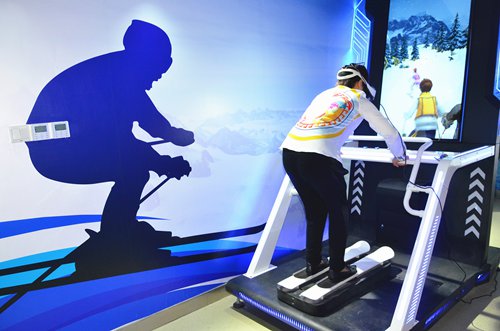
But in reality, she was standing on a plank placed on the floor in a room in a Beijing suburb, with VR goggles on.
In China, there were more than 3,000 such VR arcades in 2016. The source that provided the figure, iResearch Consulting Group, has not given the Global Times the updated statistics. According to a report by Shenzhen-based research firm Askci Corp, the market size of VR in China is expected to reach 30.09 billion yuan ($4.36 billion) next year.
With policy support from the government, China is showing that it intends to lead the VR industry by 2025, according to a document on how to accelerate the development of the industry released by the Ministry of Industry and Information Technology (MIIT) at the end of last year. The guidance pointed out that VR technology and products should be applied in manufacturing, education, culture, healthcare, commerce and trade.
In addition to strengthened policy support, MIIT called for VR talent training, international exchanges and cooperation as the country strives to lead a technological revolution in terms of artificial intelligence and intelligent manufacturing.
Desire to lead
The world's largest VR theme park opened to the public in the city of Nanchang, capital of East China's Jiangxi Province last December.
Covering 13,000 square meters, the park can accommodate 120 pieces of advanced recreational VR equipment, the Xinhua News Agency reported in December 2018.
The report noted that in a bid to embrace the emerging industry, Jiangxi launched China's first industrial VR base in 2016, and more than 200 VR-related firms have since settled in the province.
Microsoft also located its first VR/MR (mixed reality) incubator in the province last year, Xinhua said in October 2018.
"China's role [in VR development] has been on the rise - 95 percent of the world's VR equipment is produced in China," Alvin Graylin, president of HTC China, told Xinhua at the 2018 World Conference on the VR industry held in Nanchang in October 2018.
"China has a huge market, and the Chinese people are passionate about new technologies," he told Xinhua, "China has the largest number of viewers of Ready Player One [a film set in a future VR game] in the world."
Even though America delivered more AR (augmented reality)/VR revenue than China in 2017, Chinese growth in the next five years could see it dominate AR/VR in the long-term - and not by a small margin, according to a report by Silicon Valley consultancy Digi-capital in May 2018.
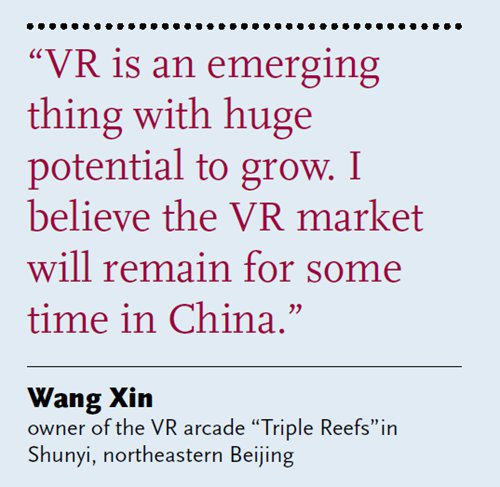
In another report by Canalys released in June 2018, the VR headset market grew by 200 percent in China in the first quarter of 2018. "Thanks to active participation from local vendors, China now dominates the standalone VR headset market, accounting for 82 percent of global shipments," said Canalys.
Early stages
Wang Xin, in his 20s, is one of the owners of the VR arcade "Triple Reefs," located in Shunyi district in northeastern Beijing.
He started the arcade due to his love of VR.
"VR is an emerging thing with huge potential to grow. I believe the VR market will remain for some time in China," Wang told the Global Times.
After opening last year, he said the peak business time was the Spring Festival period, when his arcade was visited more than 100 times in one month. Charging 128 yuan per hour, "Triple Reefs" provides four sets of VR headsets and equipment.
Unlike China's gaming sector, which felt the pinch as regulations tightened last year, VR is benefiting from preferential policies and even understanding from Chinese parents.
"Most of our customers are elementary school children who come with their parents. People in their 20s are also frequent customers," Wang said.
Some Chinese parents are going against the traditional mindset which frowns on their children taking up recreational activity and puts more emphasis on studying hard. Now, some Chinese parents are more willing to let their children experience cutting-edge technology as part of their development.
Lai Zhen, a VR analyst at iResearch Consulting Group, told the Global Times that VR applications in the educational sector are in their early stages in China, since the industry is waiting for the government's instructions on how to develop it in preschool education and improve children's all-round development.
Some experimental exploration has been carried out in Chinese schools. Recently, VR goggles were used in the classroom at the Second High School Attached to Beijing Normal University. Students used them to dive into the sea, hurtle through outer space and witness a smoke-filled battlefield. Scenes normally only described in words in text books were brought to life in front of the students' eyes.
Lai said that in the subjects of natural science and arts, VR could be an invaluable tool to assist teaching.
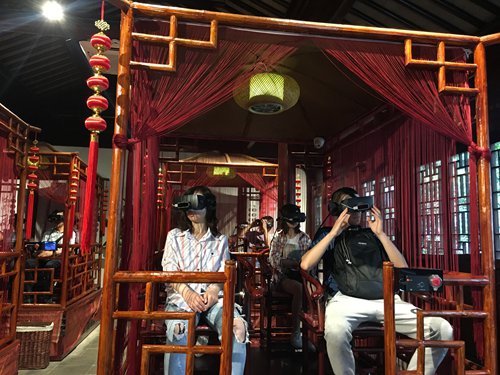
As an example, she cited a chemistry experiment that was too dangerous to be conducted by young children. A teacher could demonstrate the experiment in front of the classroom, but the students sitting in the back row would not be able to see it clearly. Even though most classrooms in China use projectors to show teacher's instruction is doing, such methods may not gain the students' full attention.
"However, if every student puts VR goggles on, they can all have an immersive and interactive experience," Lai noted, saying VR has the power to create more interest and broaden students' horizons.
In China, VR applications are used in a wide variety of fields, from adjuvant therapy to training pilots. Other uses in healthcare, precision and advanced industries, filming and television have all been explored on a trial basis.
Challenges ahead
One major factor that will influence the development of China's VR will be content.
In Chinese app stores, a search for "VR" will mostly yield results related to VR content platforms supported by big video companies, such as iQiyi and Youku (Chinese YouTube).
With a set of VR goggles and a screen, a girl at college can enjoy the effect of watching an IMAX movie in her dormitory.
But in Google Play Store, there are a large number of VR games, which means developers are dedicated to creating content.
VR content creation is extremely difficult due to its three-dimensional features, Lai told the Global Times. She acknowledged content development in China's VR industry is lagging behind that of other countries.
Wang also pointed out that VR is not as popular in China as it is abroad. "Foreign VR players already have the equipment and headset in their homes. It will be hard for Chinese people to dedicate a particular room in their home to enjoy VR," Wang said.
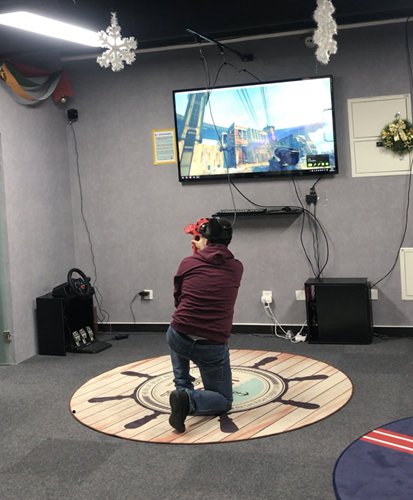
5G can offer the extremely low latency needed to deliver high-bandwidth services and removing limits on where devices are situated, according to Huawei iLab.
Paul Brown, the general manager for Europe for VR pioneer HTC Vive, said that he believes 5G could bring mobile VR into line with experiences enjoyed by consumers using high-end home PCs, and his company has already begun testing VR through 5G with very encouraging initial results, according to Huawei iLab.
Lai also noted that the introduction of 5G in VR could help solve the problem of feeling like you are spinning when wearing VR goggles.
"Compared with VR arcades in Japan and the US, the profitability of Chinese VR arcades is improving. More than 5,800 companies have registered VR related businesses in China as of May," Lai said this year, adding that China's VR industry is waiting for a surge on the customer side.
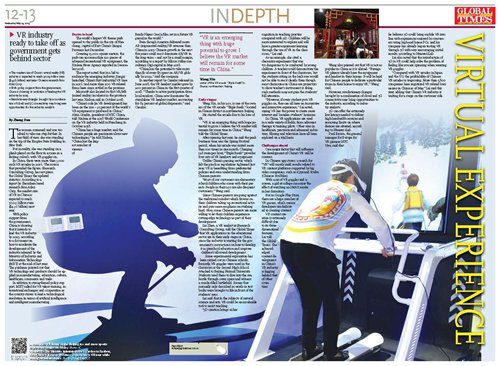
Newspaper headline: Virtual experience
○ With policy support from the government, China is showing its ambition of leading the VR industry by 2025
○ Revolutionary changes brought by a combination of cloud and 5G connectivity may bring new opportunities for the industry: analysts

A man tries VR skiing at the Beijing ice and snow sports experience center on Friday. Photo: IC
The woman screamed and was too afraid to take one step further. In her field of view, she was standing on the top of the Empire State Building in New York.But in reality, she was standing on a plank placed on the floor in a room in a Beijing suburb, with VR goggles on.
In China, there were more than 3,000 such VR arcades in 2016. The source that provided the figure, iResearch Consulting Group, has not given the Global Times the updated statistics. According to a report by Shenzhen-based research firm Askci Corp, the market size of VR in China is expected to reach 30.09 billion yuan ($4.36 billion) next year.
With policy support from the government, China is showing that it intends to lead the VR industry by 2025, according to a document on how to accelerate the development of the industry released by the Ministry of Industry and Information Technology (MIIT) at the end of last year. The guidance pointed out that VR technology and products should be applied in manufacturing, education, culture, healthcare, commerce and trade.
In addition to strengthened policy support, MIIT called for VR talent training, international exchanges and cooperation as the country strives to lead a technological revolution in terms of artificial intelligence and intelligent manufacturing.
Desire to lead
The world's largest VR theme park opened to the public in the city of Nanchang, capital of East China's Jiangxi Province last December.
Covering 13,000 square meters, the park can accommodate 120 pieces of advanced recreational VR equipment, the Xinhua News Agency reported in December 2018.
The report noted that in a bid to embrace the emerging industry, Jiangxi launched China's first industrial VR base in 2016, and more than 200 VR-related firms have since settled in the province.
Microsoft also located its first VR/MR (mixed reality) incubator in the province last year, Xinhua said in October 2018.
"China's role [in VR development] has been on the rise - 95 percent of the world's VR equipment is produced in China," Alvin Graylin, president of HTC China, told Xinhua at the 2018 World Conference on the VR industry held in Nanchang in October 2018.
"China has a huge market, and the Chinese people are passionate about new technologies," he told Xinhua, "China has the largest number of viewers of Ready Player One [a film set in a future VR game] in the world."
Even though America delivered more AR (augmented reality)/VR revenue than China in 2017, Chinese growth in the next five years could see it dominate AR/VR in the long-term - and not by a small margin, according to a report by Silicon Valley consultancy Digi-capital in May 2018.

"China has the potential to take more than $1 of every $5 spent on AR/VR globally by 2022," said the company.
In another report by Canalys released in June 2018, the VR headset market grew by 200 percent in China in the first quarter of 2018. "Thanks to active participation from local vendors, China now dominates the standalone VR headset market, accounting for 82 percent of global shipments," said Canalys.
Early stages
Wang Xin, in his 20s, is one of the owners of the VR arcade "Triple Reefs," located in Shunyi district in northeastern Beijing.
He started the arcade due to his love of VR.
"VR is an emerging thing with huge potential to grow. I believe the VR market will remain for some time in China," Wang told the Global Times.
After opening last year, he said the peak business time was the Spring Festival period, when his arcade was visited more than 100 times in one month. Charging 128 yuan per hour, "Triple Reefs" provides four sets of VR headsets and equipment.
Unlike China's gaming sector, which felt the pinch as regulations tightened last year, VR is benefiting from preferential policies and even understanding from Chinese parents.
"Most of our customers are elementary school children who come with their parents. People in their 20s are also frequent customers," Wang said.
Some Chinese parents are going against the traditional mindset which frowns on their children taking up recreational activity and puts more emphasis on studying hard. Now, some Chinese parents are more willing to let their children experience cutting-edge technology as part of their development.
Lai Zhen, a VR analyst at iResearch Consulting Group, told the Global Times that VR applications in the educational sector are in their early stages in China, since the industry is waiting for the government's instructions on how to develop it in preschool education and improve children's all-round development.
Some experimental exploration has been carried out in Chinese schools. Recently, VR goggles were used in the classroom at the Second High School Attached to Beijing Normal University. Students used them to dive into the sea, hurtle through outer space and witness a smoke-filled battlefield. Scenes normally only described in words in text books were brought to life in front of the students' eyes.
Lai said that in the subjects of natural science and arts, VR could be an invaluable tool to assist teaching.

Visitors to The Humble Administrator's garden in Suzhou,East China's Jiangsu Province, experience a VR tour while sitting on sedan chairs. Photo: Zhang Dan/GT
"3D creation brings richer cognition in teaching practice compared with 2D. Children will be more interested to explore and will have a greater enjoyment learning through the use of VR in the classroom," Lai said.As an example, she cited a chemistry experiment that was too dangerous to be conducted by young children. A teacher could demonstrate the experiment in front of the classroom, but the students sitting in the back row would not be able to see it clearly. Even though most classrooms in China use projectors to show teacher's instruction is doing, such methods may not gain the students' full attention.
"However, if every student puts VR goggles on, they can all have an immersive and interactive experience," Lai noted, saying VR has the power to create more interest and broaden students' horizons.
In China, VR applications are used in a wide variety of fields, from adjuvant therapy to training pilots. Other uses in healthcare, precision and advanced industries, filming and television have all been explored on a trial basis.
Challenges ahead
One major factor that will influence the development of China's VR will be content.
In Chinese app stores, a search for "VR" will mostly yield results related to VR content platforms supported by big video companies, such as iQiyi and Youku (Chinese YouTube).
With a set of VR goggles and a screen, a girl at college can enjoy the effect of watching an IMAX movie in her dormitory.
But in Google Play Store, there are a large number of VR games, which means developers are dedicated to creating content.
VR content creation is extremely difficult due to its three-dimensional features, Lai told the Global Times. She acknowledged content development in China's VR industry is lagging behind that of other countries.
Wang also pointed out that VR is not as popular in China as it is abroad. "Foreign VR players already have the equipment and headset in their homes. It will be hard for Chinese people to dedicate a particular room in their home to enjoy VR," Wang said.

A man plays a VR game at the "Triple Reefs" VR arcade located in Shunyi, northeastern Beijing. Photo: Zhang Dan/GT
However, revolutionary changes brought by a combination of cloud and 5G connectivity may bring opportunities to the industry, according to industry analysts.5G can offer the extremely low latency needed to deliver high-bandwidth services and removing limits on where devices are situated, according to Huawei iLab.
Paul Brown, the general manager for Europe for VR pioneer HTC Vive, said that he believes 5G could bring mobile VR into line with experiences enjoyed by consumers using high-end home PCs, and his company has already begun testing VR through 5G with very encouraging initial results, according to Huawei iLab.
Lai also noted that the introduction of 5G in VR could help solve the problem of feeling like you are spinning when wearing VR goggles.
"Compared with VR arcades in Japan and the US, the profitability of Chinese VR arcades is improving. More than 5,800 companies have registered VR related businesses in China as of May," Lai said this year, adding that China's VR industry is waiting for a surge on the customer side.

Newspaper headline: Virtual experience